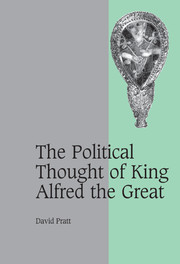Book contents
- Frontmatter
- Contents
- Acknowledgements
- List of abbreviations
- Note on citations
- Chapter 1 INTRODUCTION
- Part I The West Saxon Political Order
- Part II Alfredian Discourse and its Efficacy
- Appendix: West Frankish deployment of Solomon's dream
- Bibliography
- Index of manuscripts
- General index
- Cambridge Studies in Medieval Life and Thought Fourth Series
Appendix: West Frankish deployment of Solomon's dream
Published online by Cambridge University Press: 06 July 2009
- Frontmatter
- Contents
- Acknowledgements
- List of abbreviations
- Note on citations
- Chapter 1 INTRODUCTION
- Part I The West Saxon Political Order
- Part II Alfredian Discourse and its Efficacy
- Appendix: West Frankish deployment of Solomon's dream
- Bibliography
- Index of manuscripts
- General index
- Cambridge Studies in Medieval Life and Thought Fourth Series
Summary
The following passages document West Frankish use of Solomon's dream by ecclesiastical writers under Charles the Bald (see above, pp. 159–63, cf. 278–9); generally addressed to the ruler himself, deployment shows consistent sensitivity to his political circumstances.
1. Letter of Lupus of Ferrières to Charles the Bald, written shortly after the quashing of a rumour that Charles had been killed in battle against the Bretons on 22 November 845:
‘Praeterea mementote, quod Salomon ad regendum populum Israel, cui diu in maxima pace praesedit, sapientiam potissimum postulavit’ (‘Moreover, remember that Solomon asked, in preference to all else, for wisdom in order to rule the people of Israel, over whom he presided for a long time in the greatest peace’): Epistolae, ed. Marshall, no. 33, p. 45.
2. Dedicatory verse by Audradus Modicus to Charles's First Bible, made at Tours and presented by the canons in 845:
‘Ante tamen reserat clare primordia cosmi / Et per quam illius esse fuit sophiam … Quoque modo quisquis caveat munitus ab armis / Hostis perversi tela inimica nimis. … Quisquis es instructus mundanis usibus hisce, / Quis Salomone opibus ditior emicuit? / Hoc concessa cui dives sapientia fecit, / Regibus ac cunctis hunc ea proposuit. / Tu quoque, qui es humilis, prudens – intentio sancta – / Se propter sophiam dilige, posce, cape’ (‘Yet earlier [the bible as divine law] reveals clearly the beginnings of the universe, and through [the bible's] wisdom it came into existence … Let anyone who is only defended by arms fear the greatly hostile weapons of the wicked enemy. … Those of you equipped with worldly benefits, gape: who shone forth richer in riches than Solomon? Rich wisdom, when granted to him, did this, and placed him ahead of all kings. You also, who are humble and prudent – a holy intention – love, seek, grasp wisdom on its own account’): Dutton and Kessler, First Bible of Charles the Bald, pp. 110–13, lines 157–8, 163–4 and 179–84 (my translation differs slightly).
- Type
- Chapter
- Information
- The Political Thought of King Alfred the Great , pp. 351 - 356Publisher: Cambridge University PressPrint publication year: 2007

